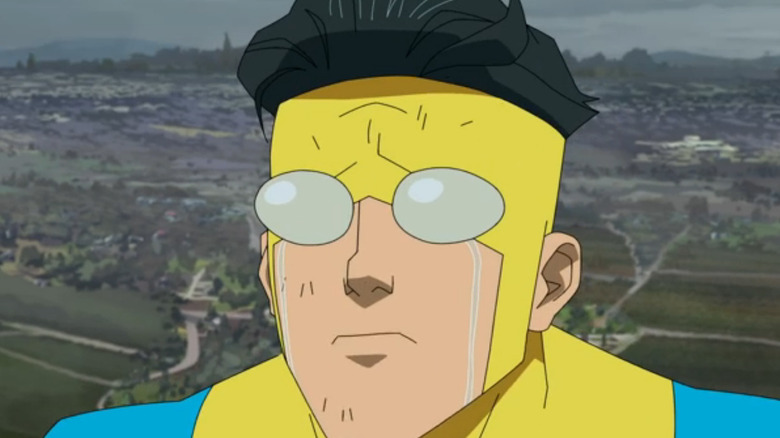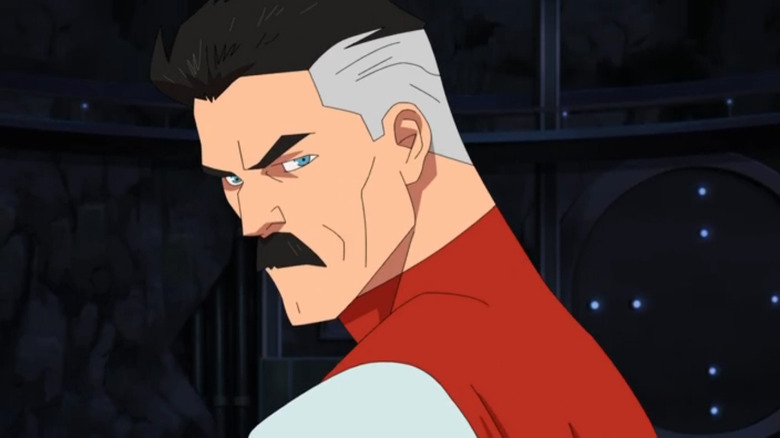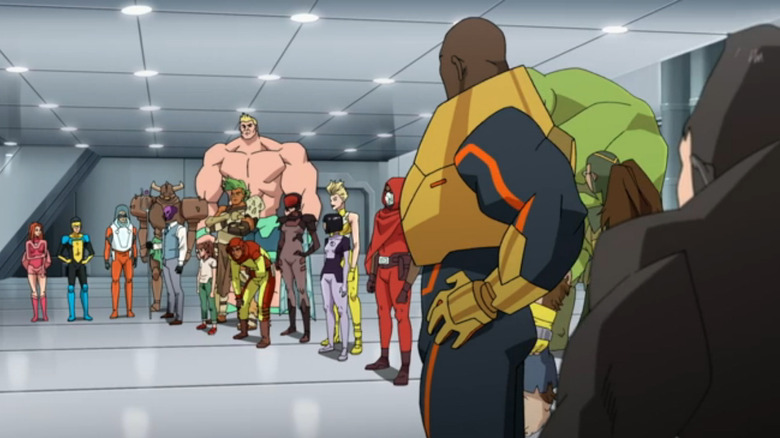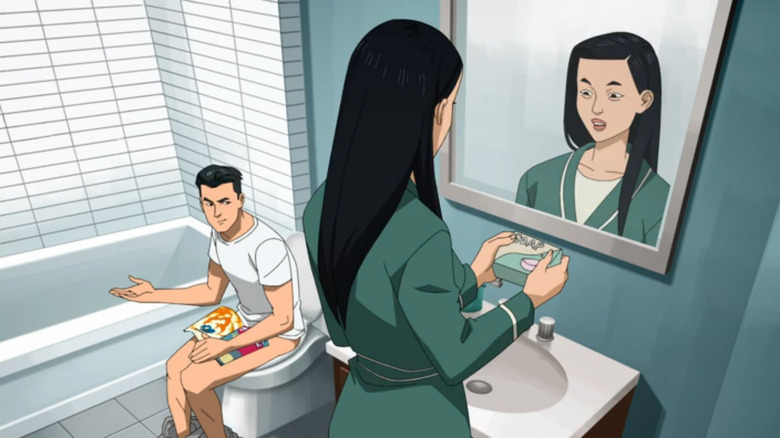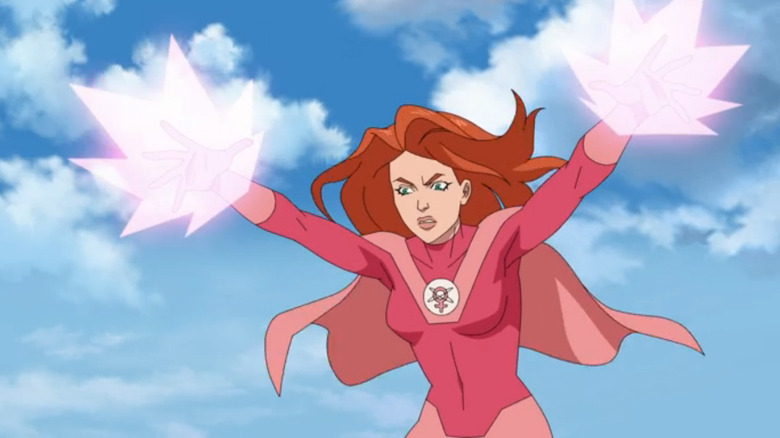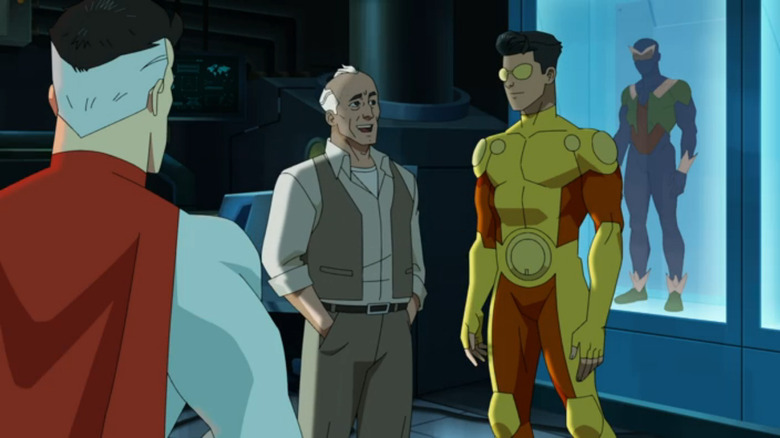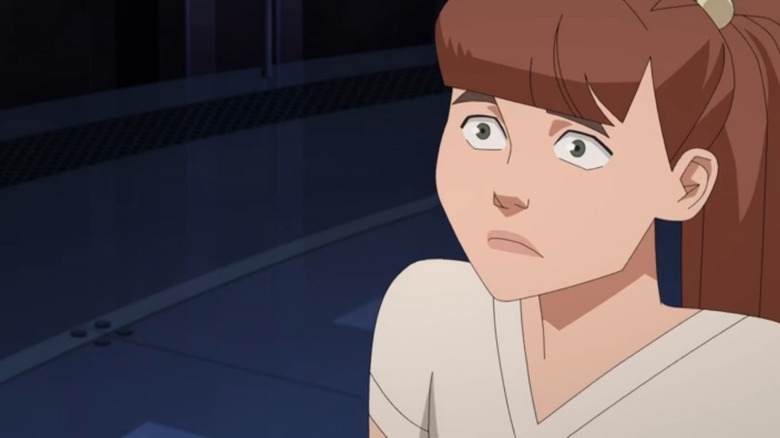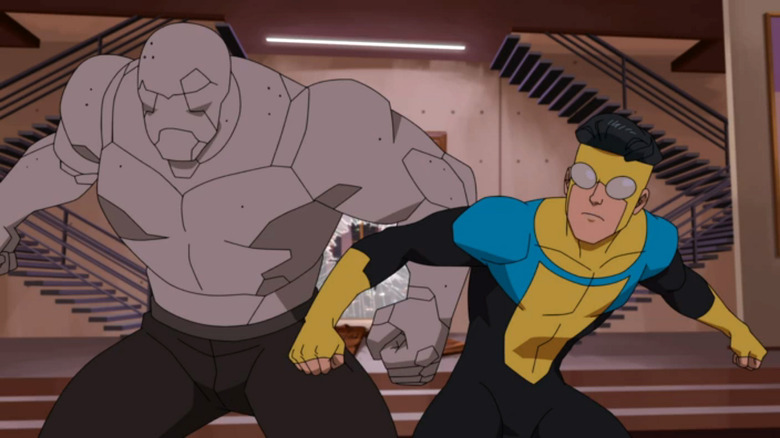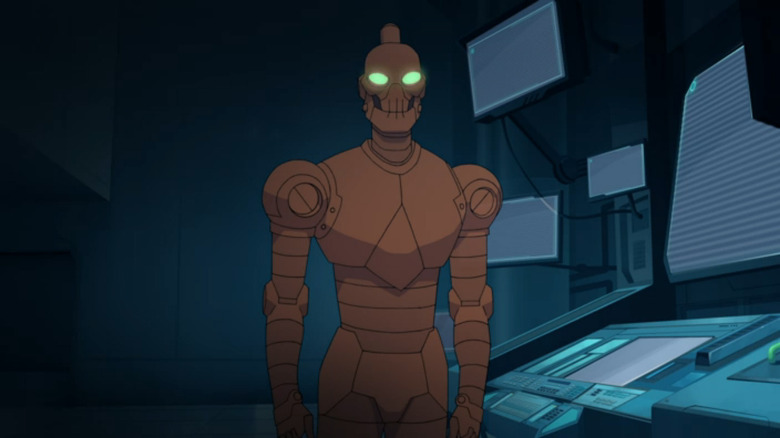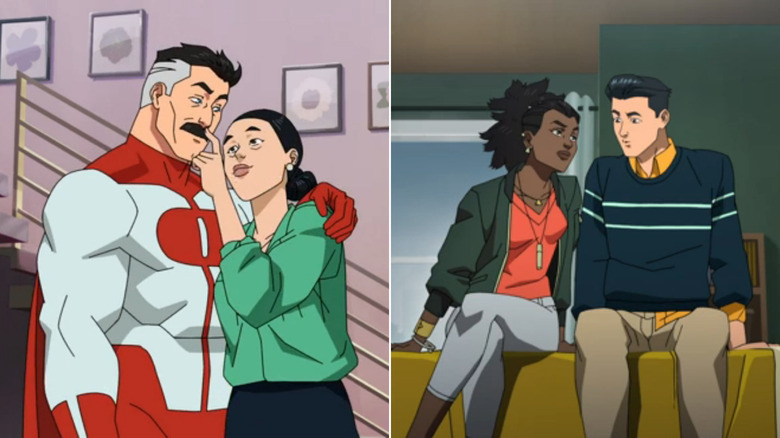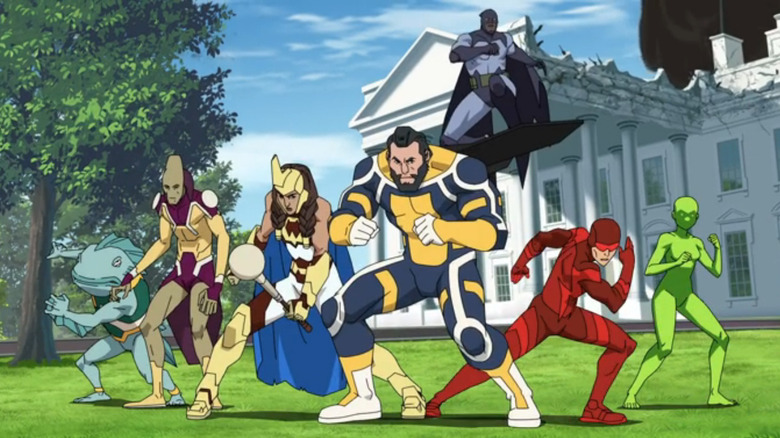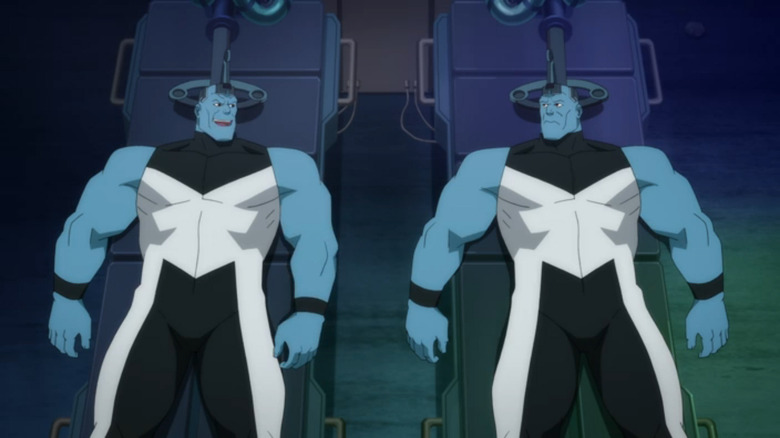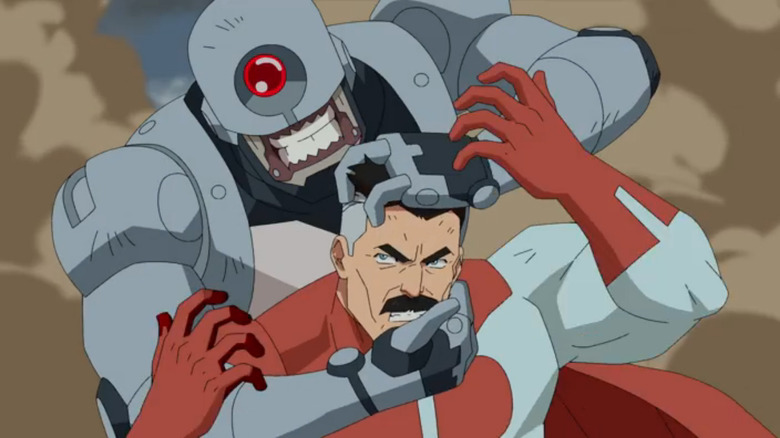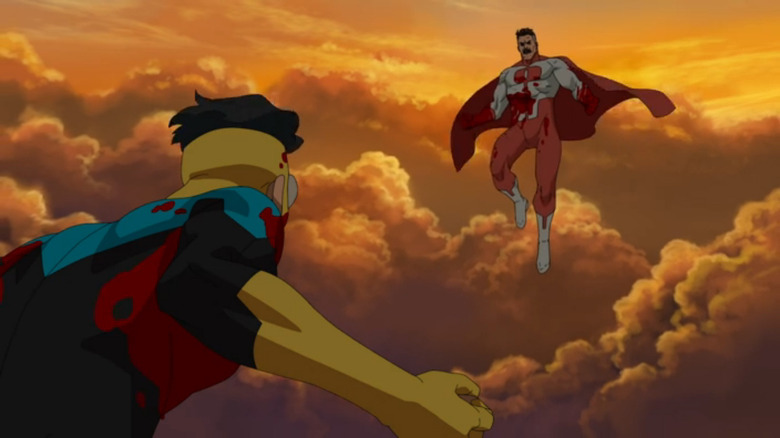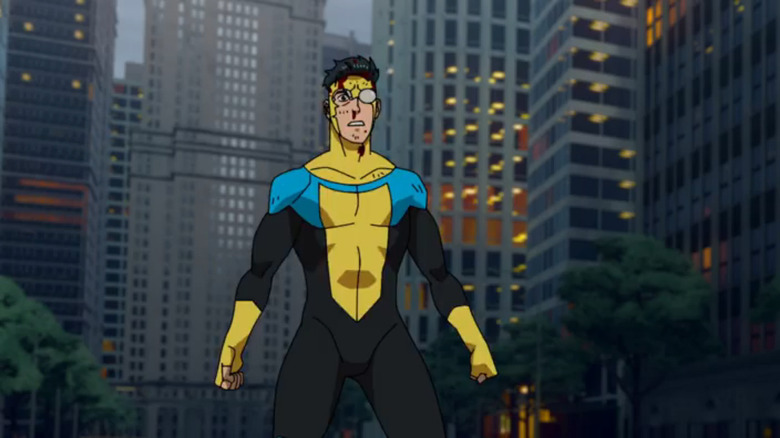The 7 Best And 7 Worst Things In Invincible
The first season of the superhero series "Invincible" was unlike anything superhero fans had seen before on television. Like "The Boys" (or "Heroes" before them), it set its story in a world where some humans had been blessed (or cursed, depending on how you look at it) with elevated gifts, grappling with the consequences. It presented the material with the same ribald language and unapologetic violence as "Boys," but through its animated look and powerful writing, frequently brought just a bit more heart.
"Invincible" was unabashedly bold, effective storytelling, and by the conclusion of Season 1 many of its risky storytelling decisions ended up paying off.
That being said, not all of the big swings this show took landed as squarely as a punch to the face from Omni-Man. Some decisions played less like a plot twist and more like a turn-off, while others still seem to have the jury out on whether they'll pay off effectively. Keeping in mind, of course, that the show is based on a series of comics from "The Walking Dead" creator Robert Kirkman that seems to be picking and choosing (a la "Game of Thrones") which components of its source material to take liberties with.
With all that under consideration, here are some takeaways on Season 1 of "Invincible," the good, the bad, and everything else.
Best - The first episode twist punched us in the heart
The first episode of "Invincible" opened with a Washington, DC under attack by supervillains. Fortunately, the world's greatest superheroes arrived just in time to save the day. When it seemed the situation was too much for them to handle, however, the Guardians themselves were saved by the greatest superhero of all: Omni-Man (voiced by JK Simmons).
We then met our teenage protagonist, Mark Grayson: The half-human, half-alien son of Omni-Man, Mark was developing his powers for the first time, stopping his first crime, and juggling the responsibilities of being a superhero and a normal teen. Up until this point, the story felt like a cute but fairly generic, family-friendly superhero tale.
Then, at the end of the episode, everything changed. In response to an alarm, the Guardians of the Globe assembled at their headquarters, only to be torn apart by Omni-Man with his bare hands in what will likely go down as one of the goriest sequences (animated or otherwise) of 2021.
Episode 1's conclusion was as painful and brilliant as it was a thought-provoking cliffhanger. Why had Omni-Man (who is clearly, in everything but name, Superman) done this? The plot twist hit like a freight train.
Worst - The new Guardians roster made zero sense
After the Guardians of the Globe were obliterated, the government held tryouts to put together a new team of global defenders. During this process, it was stated that heroes would not be evaluated solely by the strength of their abilities, but also by "the strength of [their] character."
Dozens of diverse, fascinating heroes from around the world showed up to these tryouts, so much so that Invincible (voiced by Steven Yeun) could be seen geeking out at some of the heavy hitters assembled in the room. Also trying their luck were the members of "Teen Team," a group of d-list teenage heroes (read: Teen Titans) that Invincible had joined forces with on a previous occasion.
The resolution of these supposedly unbiased tryouts, unfortunately, was so ineffective that it undermined its impact. When the new roster is finalized, it includes all four members of Teen Team — more than half of the new Guardians of the Globe. So, in a world populated by countless veteran superheroes, the world's greatest team just happens to be ... Invincible's not-ready-for-prime-time teen buddies?
Without a doubt, the member of Teen Team who least belongs on the Guardians is Rex Splode (voiced by Jason Mantzoukas). Not only are his superpowers unimpressive, but he is consistently portrayed as volatile, abrasive and undisciplined.
After it was explicitly stated that the new heroes would be chosen on the basis of their character, it makes no sense that Rex Splode would make the cut.
Best - The characters were all instantly compelling
The best thing about "Invincible" is the characters. Pretty much any time "Invincible" decided to introduce a new one, it didn't take long for us to fall in love. The series knows how to establish a character efficiently, telling us everything we need to know about them, even if they're destined to be killed off quickly (Donald Ferguson, we miss you already!).
For instance, when we were introduced to our protagonist Mark, we found him reading a superhero comic book while sitting on the toilet. A moment later, when Mark's mom Debbie Grayson (voiced by Sandra Oh) barged into the bathroom and began rooting through the cabinet and Mark protested, her response gave us all the insight we needed: "Get over yourself. I used to change your diapers, kid. There's nothing going on down there I haven't seen before."
Such moments reveal a lot while saying little. Mark is a starry-eyed dreamer who loves superheroes, but he's also a shy and awkward teen averse to conflict but who will eventually need to learn to stand up to his parents. Debbie, on the other hand, is able to command any room she walks into — even a tiny bathroom. Also, when she wants something, she doesn't let anything stop her.
The scene also shows how she's willing to violate the privacy of her family members on occasion, which ... stay with us here .... foreshadows the later conflict between her and Nolan, as she secretly investigates his illicit activities.
Worst - Atom Eve's powers are extremely frustrating
When we first met the superhero Atom Eve (voiced by Gillian Jacobs from "Community"), her powers seemed to be fairly straightforward. She can fly, and she creates pink energy blasts and forcefields. Not too bad, but certainly nothing that seemed to place her among the elite. After all, when Eve and the rest of Teen Team battled an invading force of aliens, it went quite poorly for them. There's clearly only so much she can do.
In later episodes, however, Eve reveals new superpowers that we've never seen before. She built an entire house for herself out of thin air in seconds, she put out a forest fire with a wave of her hand, and she causes damaged trees to instantly heal themselves and regrow. Suddenly, Atom Eve now seemed to do whatever she could imagine, with minimal effort, and any of these powers feel like they could've come in handy when the aliens were ... y'know ... on the verge of killing her, all her friends and then likely turning their sites on the entirety of human civilization.
So, is she becoming more powerful? Is she discovering new applications of her abilities? Has she always been this powerful? What exactly are her powers? There are some throwaway lines about her being able to manipulate matter on a sub-atomic level, but she certainly doesn't seem to be tapping into the potential of that.
For the record, it can be totally fine to give superheroes nigh-unlimited power, that's not the issue. Dr. Manhattan from Watchmen, for instance, is a fascinating character because of how powerful he is.
The audience wants to like Atom Eve, but as she's currently presented, we don't really know what we're intended to think about her and her abilities. Whatever the show is trying to do with this character, it does a really poor job of communicating it on a consistent basis.
Best - The voice acting is top-notch
One of the best things about "Invincible" is the voice acting. It's one thing to be stacked with amazing talent, but this is the rare project where the voices actually seem to fit the roles like a glove first, then consider star power second.
Yeun is instantly endearing in the role of our title character, Mark Grayson, aka Invincible. Sandra Oh plays his mother, Debbie Grayson, first delivering wholesome Mom energy, and later heartbreaking emotional angst. In the role of our main villain, Omni-Man, J.K. Simmons delivers a commanding and enigmatic performance that's just as good as anything he's ever done in his Oscar-winning career.
The supporting cast is equally impressive. Walton Goggins gives a commanding performance as Cecil Stedman, head of the Global Defense Agency. Gillian Jacobs, Zachary Quinto, and Jason Mantzoukas knock it out of the park as Atom Eve, Robot, and Rex Splode, respectively. Mahershala Ali gives a tremendously nuanced performance as the morally conflicted supervillain Titan, and you've got to love Mark Hamill in his recurring role as grizzled superhero tailor Art Rosebaum.
Even the minor bit parts are played to perfection by celebrities showing up for some unexpected and delightful cameos. Kevin Michael Richardson and Mae Whitman each play countless supporting roles and background characters. John Hamm voices the Secret Service agent Steve. Michael Dorn, who played Worf in "Star Trek: The Next Generation," voices the intergalactic warrior Battle Beast, and executive producer Seth Rogan excels as the enigmatic, frequently-confused invader Allen the Alien.
Worst - Monster Girl's subplot is extremely uncomfortable
As cool a character as Monster Girl (played by veteran voice artist Grey Griffin) may be, everything about her is deeply unsettling. When first introduced, she appears to be a preteen girl with the ability to temporarily shapeshift into an enormous muscular man with green skin, and that's radical. But later, we are told an unsettling truth — every time Monster Girl uses her abilities, she ages backwards by about a week. Because of this, even though she looks like she's about twelve, she's actually in her late twenties.
As you might imagine, this leads to all sorts of uncomfortable moments throughout the first season. We see Monster Girl drinking alcohol. We see multiple adult characters expressing romantic interest in her. In the end, we're left wondering what exactly the show is trying to accomplish with this character, and who thought it was a good idea?
Look, if you're a writer whose work is starting to brush up against sexualizing kids — there's two options you could take. First option, if you have to do it, do it, but have a reason why you are doing it, some sort of deeper point you're trying to make, and also, handle with care. Really give this volatile subject matter the time and attention it deserves. If you can't handle that, then the second option is just staying away from it entirely.
Based on how these segments are written, and how little screentime Monster Girl receives, it feels like "Invincible" hasn't earned the right to wade into these problematic waters.
Best - The episodes are wonderfully self-contained
Nowadays, many "prestige" shows spend far too much time on slow moving, season-long plot arcs. Perhaps driven by a desire to increase the show's "bingeability," many shows seem to exist solely to pace out a series of reveals, each designed to hook you into watching another episode — rather than simply making each episode interesting in and of itself. This often leads to a sense the episodes are all blurring together, which is why when you think back on a season of some shows, you can't remember which plot point occurred in which episode.
"Invincible," however, breaks this trend in the most wonderful way possible. Most episodes are built to tell tight and compelling stories with a clear beginning, middle, and end, with each story introducing us to new characters, locations, and problems that we've never seen before and will never see again.
You'll definitely remember the episode where Mark teamed up with a supervillain to overthrow a crime lord, or the one where he discovered that college students were being transformed into robots, or the one where he went to Mars. All distinctive, well-told stories on their own, even if there are some slowly-developing elements (like the inevitable revelation of Omni-Man's monstrous misdeeds) that carry across them.
Worst - Robot's story is creepy and unsatisfying
At first the superhero Robot seemed to be, as his name suggested, a robot. However, we later learned that this synthetic crimefighter is actually being remote-controlled by a man (or at least, what's left of one) named Rudy.
Plagued by an undefined disability and terminal illness, he has decided to grow a new human body for himself, then upload his consciousness into it. If that wasn't weird enough, his new body was an exact clone of Rex Splode, aged to be a child so it can be the same "age" as the body of Monster Girl, whom Rudy has romantic feelings for. And oh, by the way, neither Rex nor Monster Girl knew about or consented to Rudy's plan ahead of time.
It's a plotline that's clearly supposed to be creepy and weird ... mission accomplished.
If handled correctly, the sci-fi themes should raise all sorts of questions about the nature of self and the ethics of living in a world of super-science. The problem, however, is that the show didn't spend any time exploring these questions.
Instead, it was all just awkwardly crammed into the b-story of the second-to-last episode. When Rudy's new body showed up at Guardians HQ, the rest of the team seemed appropriately creeped out for a minute, but then they just moved on, apparently accepting this "new" Robot into the team without mentioning it again for the remainder of the season.
While the subplot definitely has potential, why do it in Season 1 if there wasn't enough room to really dig into it, and why in this half-hearted way? Hopefully, Robot's deeply strange story gets more screentime in Season 2, because it currently feels disastrously undercooked.
Best - The romantic relationships are genuinely compelling
Though you might think of "Invincible" as a show that's all about brutal action and offbeat humor, one of the things it consistently handles best is interpersonal romantic drama. Season 1 features two moving romances — one between Mark and Amber (voiced by "Deadpool 2" actress Zazie Beetz), and the other between Nolan and Debbie — that are both beautiful, fascinating, and ultimately tragic.
At first, Nolan and Debbie were presented as the rock-solid couple, deeply in love and very affectionate. When Nolan got home from saving the world in the first episode, Debbie lead him upstairs, saying, "Now, let's get you out of that costume." But then, as she slowly began to uncover the truth about who Nolan really was, we saw her come to realize that she didn't actually know anything at all about the man she loves.
When Mark started dating his classmate Amber, they seemed to be settling into the classic superhero relationship. Mark was always off saving the day like Spider-Man, and Amber was always being stood up on dates like Mary Jane. But, this being 2021, Amber surprised the audience by refusing to be the helpless girlfriend. She broke up with Mark, and even when he revealed his true identity, she barely acknowledged it. She already figured out that he was Invincible, she said, and she doesn't care.
Amber's refusal to fall in line for a partner that lies to her, a partner that doesn't trust her enough to share his secrets, feels like Lois Lane revealing herself as the intelligent woman we're always told she is, but frequently doesn't act like. It's an interesting subversion of classic superhero tropes, but honestly, Amber's viewpoint makes total sense. Kids, don't hide stuff from your partner.
Worst - We miss the original Guardians
One of the reasons why the deaths of the Guardians of the Globe hit so hard is because they seemed so cool.
Right before their communicator watches all started beeping, we got to see a brief montage of all the various Guardians just living their normal lives. Red Rush on a date with his wife; Martian Man hanging with his kid sidekick; Green Ghost her day job as a photographer. It's such a tease because just as these characters endeared themselves to us — and their powers seemed cool too (even if many played off archetypes of Flash, Martian Manhunter, etc) — they were brutally murdered.
It worked, yeah. But it kind of worked too well.
When the Guardians of the Globe got replaced, and we were introduced to the real main characters of the show, they paled in comparison. Not only in superpowers, but also their personal lives.
Dupli-Kate, Monster Girl, Black Samson, Shrinking Rae — we never got to see them doing anything other than superhero stuff. What about their personal lives? Does Dupli-Kate play bass guitar in a punk band? Is Black Samson going through a difficult divorce? Come on, make us care about the new Guardians the way you did the old ones! Heck, with some of these characters, we don't even know their real names.
Best - The world is gloriously weird
One of the coolest things about "Invincible" has to be its totally bonkers setting. From the very first moments, this show tossed its audience into the deep end, immersing viewers in a complex, sprawling universe that felt familiar to veteran superhero fans, and unpredictable to everyone — flavored with a unique, dark sense of humor all its own. It also respected the audience enough to never slow down and explain things — keep up, "Invincible" said, or you'll be left behind.
Interesting oddities permeated every corner of this universe, like the demon detective Damien Darkblood (Clancy Brown), a grumbly hardboiled hybrid of Rorschach from "Watchmen" and Hellboy himself. Then there were the scene-stealing Mauler Twins (both voiced by Kevin Michael Richardson), a pair of brilliant supervillain scientists who, despite their names, weren't actually twins. Instead, one was the clone of the other, but the joke is that neither knows for certain which is which. There was also the cold-hearted crime lord Machine Head (Jeffrey Donovan), a rich and fashionable cyborg mastermind who spoke with an auto-tuned voice.
If we listed all the absurd nonsense that tickled us about this setting, we'd be here all day — but taken as a whole, it felt every bit as rich as the worlds of Marvel or DC, but just a little bit sillier, stranger and perhaps more unpredictable.
Worst - The penultimate episode was kind of a mess
Though most episodes of "Invincible" were consistently amazing, "We Need to Talk" was the weakest.
At that point, Debbie and Cecil had both figured out that Nolan killed the Guardians. The only who didn't know yet was Mark, so the episode had Cecil trying to contact Mark while Nolan was trying to find him first and tell his son the truth. The whole thing felt like the TV equivalent of calling somebody who won't pick up the phone — and frankly, there wasn't enough going on elsewhere to fill an entire episode.
Sure, it gave us Cecil unleashing every secret government project the GDA had at their disposal on Omni-Man. But some of those bits went on for way too long, and felt awfully redundant.
After Nolan was unaffected by a laser that hit with the force of a nuke, are a few robot zombies really supposed to create any tension? Also, as cool as the sequence with the space laser was, it was a beat-for-beat copy of an iconic scene from "Akira."
Add in the aforementioned b-story where Robot cloned himself, and "We Need to Talk" ended up being a hot mess of an episode. Maybe it was just killing time before the finale — stalling the audience in the same way all that stuff was supposed to stall Omni-Man — but its storytelling beats ranged from uninspired to downright puzzling.
Best - The season finale will stay with us forever
Although "Invincible" had its fair share of ups and downs, the season finale "Where I Really Come From" was flawless.
Mark learned that his father killed the Guardians, Nolan explains why he did what he did, and an epic smackdown ensued.
Driving home the Darth Vader-like argument that Mark should join him on the dark side, Omni-Man made his point not with pie-charts and Socratic reasoning, but instead causing widespread collateral damage that decimated buildings, trains, and hundreds of innocent people. The more Mark tried to "save the day," the more his father crushed and dismembered civilians in front of him to drive home the point that they're little more than ants underfoot.
Mark was clearly the underdog in the fight, by a pretty significant margin, but audiences conditioned to happy endings expected him to muster up something clever that would take down Omni-Man. That would have been so satisfying, but no, instead Mark ended up bruised, bloody, near death ... but nevertheless, unwilling to concede the key point that human are worth saving.
In that final, powerful moment, Nolan could not bring himself to kill his own son. With tears in his eyes, Nolan retreated from both the fight and Earth altogether. Obviously, in future seasons of "Invincible," we'll hear from him again. But wow, this season finale powerfully established that Mark is a man of his convictions ... and his father might have some wiggle room.
Worst - The violence can sometimes be a bit much
This particular issue won't be a problem for some viewers, but much like "The Boys," the absurdly gory violence that "Invincible" frequently hit audiences with wandered into the danger zone of being so excessive that it smothered key story beats.
Sure, "Invincible" is, in many ways, a show about violence. It muses on the nature of mortality and the value of human life. It seeks to subvert the usual bright and bloodless world that superhero fiction portrays, and instead show us a world of violence, suffering, and death. We get it.
But sometimes, that makes it a tough watch. The bloody murder of the Guardians of the Globe was designed to horrify viewers — but even once the point was made, the scene went on forever. Episode after episode, the shock carnage was over-used to the point where it threatened to lose its meaning. Violence in shows like this can be an escalation — if eyeballs are popping out, skulls are exploding and people are ripping out each other's hearts now, how effective will that stuff be by the time Season 3 rolls around?
To be fair, this use of gore is indeed inspired by the "Invincible" comics, which have some shockingly bloody panels of their own. But when it's happening in a single comic book panel, a viewer can choose not to linger on an image — watching these sequences for multiple minutes on end (with sound effects!) can just be too much.
Overall, it's hard to remember a series whose first season showed as much promise as the eight episodes of "Invincible." Here's hoping the show can lean harder into the good, dial back on the bad, and continue its powerful hold on fans for many seasons to come.
